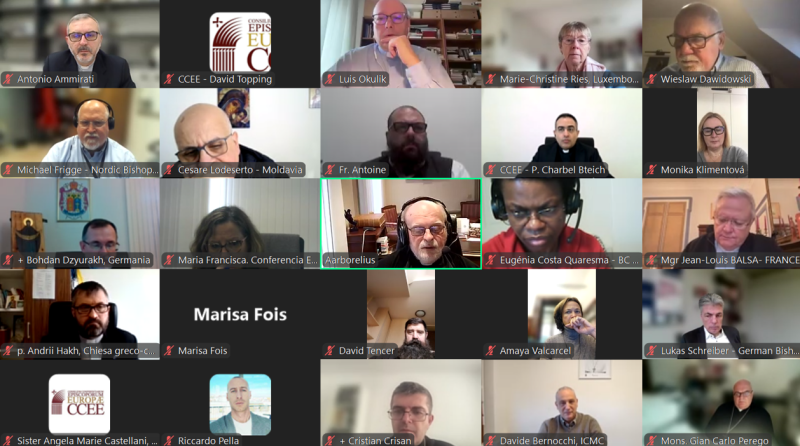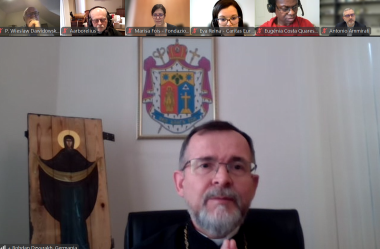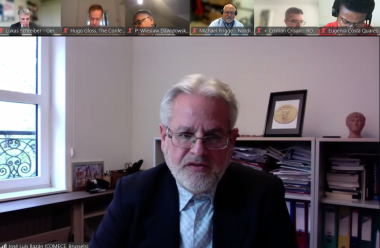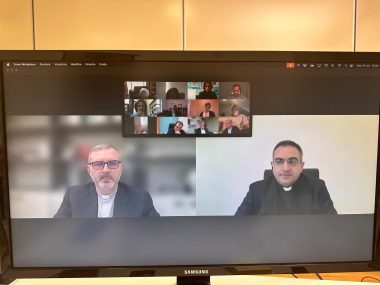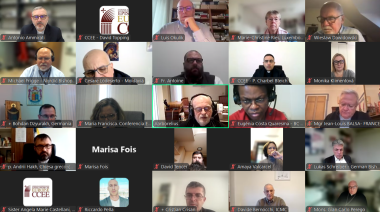On 20 November 2024, a webinar was held for the national directors of the Migration Section of the CCEE Commission for Social Pastoral Care. The proposed reflection was on the theme “Welcoming and integrating migrants and refugees in the quest for peace”, starting from the current situation in the world, and particularly in Europe, with a focus on activities in favour of refugees in the ecclesial environment and in society.
The opening session was conducted by the moderator of the webinar Rev. Luis Okulik, Secretary of the CCEE Commission for Social Pastoral Care, and introduced by H.E. Msgr. Bohdan Dzyurakh, Exarch for the Ukrainian Greek Catholic Faithful in Germany and President of the same Commission, as well as by Rev. Antonio Ammirati, CCEE General Secretary.
In his opening to the meeting, H.Em. Card. Anders Arborelius, Bishop of Stockholm and Head of the CCEE Migration Section, emphasised the prophetic mission of the Church in proclaiming the Gospel to those who suffer. “We have a duty to offer consolation and help, and to open our churches to those in need. Welcoming all those in need and helping their integration is our duty even though this may not always be popular. People coming from countries in conflict can also be messengers of peace”.
In his report entitled “The consequences of current wars on the flow of migrants towards Europe”, Davide Bernocchi, Secretary General of the International Catholic Migration Commission (ICMC), presented a global overview of the main migration corridors, the most affected areas, as well as the location of migrants, and in particular refugees, both to and from Europe and throughout other continents. A significant figure emerges: as of the end of June 2024, there are 122.6 million forcibly displaced persons in the world due to persecution, conflict, violence, human rights violations and/or events that seriously disturb public order. Bernocchi also underlined the fact that most people in need of aid remain in their countries of conflict.
The “Recent developments in European Laws on migrants and refugees” was treated by José Luis Bazán, Secretary of the Commission on Migration and Asylum for the Commission of the Bishops’ Conferences of the European Union (COMECE). At the centre of his presentation was the EU Pact on Migration and Asylum of May 2024, which is based on 10 interdependent building blocks and is to be implemented in its entirety. The EU Pact is supposed to be implemented by member states by mid-2026, but many countries doubt its feasibility. Bazán also highlighted the amendment of the anti-trafficking directive in which new categories of crimes were added, including forced marriage, illegal adoption, and surrogacy for the purpose of reproductive exploitation.
On the part of the Dicastery for Promoting Integral Human Development, Amaya Valcárcel, presented “The activities and declarations of the Holy See on the consequences of wars on migration flows”. She included three main points: the Dicastery’s mission; activities on migration flows; and the resources the Dicastery can offer. Valcárcel outlined the most important challenges along with some of the Church’s responses to migration, and reported on the four verbs Pope Francis habitually uses when speaking about migrants and refugees: welcome, protect, promote, integrate, inviting each church institution to associate these verbs with its local reality, asking whether and how they are active. She concluded, “Let us not forget that forcibly displaced persons and communities are refugees, yes, because of despair, but in line with the motto of the 2025 Jubilee, we can also proclaim them ‘pilgrims of hope’”.

